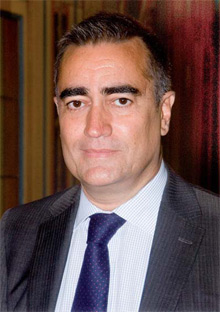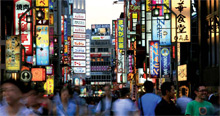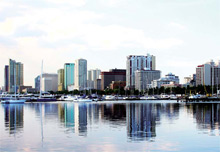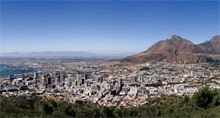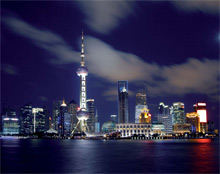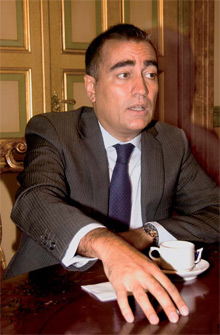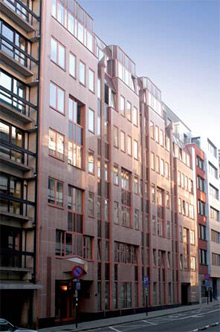Jesús Galeote: Manager of the Asia, Africa and Australasia (AAA) geographical area MAPFRE REMARKETS
Jesús Galeote Ferrero was born in Madrid on 7 February 1960. He graduated in 1984 from the Complutense University of Madrid, where he had studied Economics and Business Studies, specialising in Econometric Analysis and Quantitative Economics. He speaks four languages.
He started his career at MAPFRE, Servicios de Reaseguro, in October 1985 after contacting the company in response to a newspaper advertisement. “I joined the company because they needed to replace someone who was working in facultative reinsurance. They trained me for a month and a half - and then it was down to work”, he comments. From then on, his career would take him ever upwards; from being Assistant Underwriter for facultative business in Spain he went on to write non-proportional treaties all over the world. 1987 saw the establishment of MAPFRE XL, Compañía Internacional de Reaseguros, S.A., where he continued with this task until, in 1990, he became a non-proportional treaty underwriter for the United States, Asia, Spain and Portugal. In 1992 he was appointed Deputy Manager of the [Reinsurance] Protection and Retrocession Department.
In 1994 he was transferred to Brussels as Technical Manager of CIAR, Compagnie Internationale d’Assurance et de Réassurance, a MAPFRE subsidiary. Europe was his area of operation. In 1998, after MAPFRE's four reinsurance subsidiaries had been combined into a single company, MAPFRE RE, Compañía de Reaseguros, he was appointed Underwriting Manager for proportional business in “non-EPLA” countries, i.e. countries other than Spain, Portugal and Latin America. In 2002 he was moved to his current area of responsibility: Manager of the AAA (Asia, Africa and Australasia) geographical area.
"MAPFRE RE`s portfolio has not changed" A career devoted entirely to reinsurance at MAPFRE. This could be a concise way of introducing Jesús Galeote, who started working in the area of reinsurance at MAPFRE 25 years ago. His career has been rich in variety and stories, typical of someone fully involved in his work as the Manager responsible for AAA, which comprises the geographical areas of Asia, Africa and Australasia. Knowledge, experience and personal relationships which help promoting the business of MAPFRE RE, one of the world’s top 15 reinsurers.
When you first came to MAPFRE, were there
any concerns about reinsurance?
I joined in 1985, when MAPFRE Servicios de
Reaseguro had already been created. There
were very few of us at that time and the
reinsurance we did was very basic, with some
of it being arranged over the phone. We did
facultative reinsurance practically only in
Spain and were starting to get involved for
the first time on contracts from Europe and
Latin America. This was a time when in Spain
even household policies were being reinsured.
The people who created MAPFRE Servicios
de Reaseguro came from direct business,
where they had a lot of experience.
They only did business in the areas they were
familiar with. For many years, everything
was focused on Non-Life business; we only
started with Life business a relatively short
time ago.
You started off as a facultative underwriter and
then moved into non-proportional reinsurance
until 1992. How did that experience influence
your knowledge of insurance techniques and
your subsequent professional activities?
My best asset was being able to speak English.
Right from the outset I was involved in business
relating to non-Spanish-speaking countries.
My first business trip was to Germany, where
I spent one period of training at Bayerische
Rück and another with the broking firm of
Jauch & Hübener. We stepped up business with
Europe by working with reinsurance brokers
from London, Copenhagen and Paris. Speaking
English was essential. We then started to work
in the USA through the Paris correspondents
of US brokers.
Twenty five years ago, reinsurance was based on personal relationships
MAPFRE already had a calling towards Latin
America. What were they doing as regards
reinsurance?
I was not directly involved because I was
assigned to non-Spanish-speaking markets.
But MAPFRE RE did indeed begin to open
up markets in Latin America, partly because
we had a shared language and history. At
that time, not many people were interested
in reinsurance in that part of the world. My
involvement did not last very long. It was
the period in which the reinsurance monopoly
in Argentina ended. MAPFRE RE had
an office there and decided to boost its portfolio.
But we had to start practically from
scratch with motor programmes. When
MAPFRE XL was set up in 1987, we stopped
no longer were a deparment within MAPFRE
but an independent company with other
responsibilities.
Between 1992 and 1994 you were on the other
side of the table, working for the Outwards
Retrocessions Department. The people you were talking to then were reinsurance
brokers and other reinsurers. What were the
challenges of that period?
The view changes, depending on whether you
are a reinsurer or a cedant, because the individual
objectives are different. But certainly,
you do have a different point of view. This was
very useful to me for dealing with other reinsurers
and brokers. It was also a bad time,
just after hurricane Andrew, the biggest loss
that MAPFRE RE had had to deal with up to
that point.
Did the international market give credibility
to MAPFRE as a reinsurer?
Twenty-five years ago, reinsurance was based
on personal relationships, starting with those
established by the then Chairman of MAPFRE,
Ignacio Hernando de Larramendi, and other
important Directors such as José Manuel Martínez,
the current Chairman, or Andrés Jiménez,
the current Deputy Chairman, amongst
others. Business was produced above all
through the trust generated by the MAPFRE
name. The company did not have that much
capital, nor did it have extensive experience.
It is true that MAPFRE RE was the only international
Spanish reinsurer and could be considered
rather exotic. But new goals were
sought and in 1989 the company opened an
office in London to serve the market.
Any personal anecdote?
When I went to Brussels they asked me to
look after France and I did not even speak
French,which then I learnt it in Brussels. That
is why, initially, I didn't achieve great results
on my visits to France. Later, once I had
mastered the language, I did. I visited many
companies and also the small mutuals. We
never tried to exceed our capabilities and it
worked well for us.
If it has sometimes been necessary to be flexible, this has been done with technical support
How would you sum up your stint in Brussels?
When I arrived there, MAPFRE RE already
held 51 per cent of CIAR, Compagnie Internationale
d’Assurance et de Réassurance. The
plan was that CIAR would become the branch
office for certain markets in Europe. It had
to undergo changes because, although its
underwriting standards were similar, it was
a different company and did business in a
way that was not necessarily the same as
that at MAPFRE RE. CIAR is still in existence
today, because it was involved in direct
business, but is no longer active. Things
were not so easy at the outset but that has
totally changed.
MAPFRE RE had the idea of promoting business
with local reinsurers. In those years we
relied on Caja Reaseguradora de Chile, Reaseguradora
Hemisférica in Colombia, CIAR in Belgium
and MAPFRE RE in Madrid. That was when
the rating requirements began. MAPFRE RE
decided that instead of having four small reinsurers
it could be one large one. My job in
Brussels was to transfer what CIAR was for
Europe to MAPFRE RE. When we went to negotiate
on behalf of CIAR, we had to mention
that we were part of the MAPFRE Group, because
CIAR’s capital was reduced. Companies
like Ecclesiastical, Vaudoise, Cattolica and
Shelter had a stake in CIAR. All of them were
invited to participate in MAPFRE RE’s capital
and they accepted. This process of concentration
took place in 1998.
Was that what turned you into one of the
world’s top 50 reinsurers at the time?
That and the real change that occurred. Operations
in such distant markets (at that time)
as Japan and Australia were intensified. With
the capital we had and the new ratings, we
became a reinsurer to be reckoned with.
Besides Europe and Latin America, when did
the company start to work with the USA?
The company started to do business with the
USA primarily from 1987, when MAPFRE XL
was set up. The business was written from
Madrid and mainly through European brokers.
Later, the New Jersey office was opened and
we acquired Chatham, a reinsurer belonging
to the Ecclesiastical Group. They had a licence
to operate in every state, which made it more
interesting, and that is how MAPFRE Reinsurance
Corporation (MRC) -which was
MAPFRE RE in the USA- came into being.
Although it was a local reinsurer, its capital
was not as high as MAPFRE RE’s, which is
why it was subsequently decided to have a
single entity and operate as MAPFRE RE with
a Trust Fund for the USA.
The commercial side of things is considerably
influenced by relationships...
It has been hard work, by which I mean to say
that penetrating the European market has
taken time. But it helped me learn the commercial
side of things. You have to have some
idea of what it will take to get the business
and of the actual client as a business unit. We
are quite strict. If it has sometimes been necessary
to be flexible, this has been done with
technical support.
When you came back from Belgium your geographical
area of responsibility was very big.
How did you ensure the continuity of the work
done by your predecessors at MAPFRE RE in
such far-off markets as Japan, the Philippines
and Southeast Asia? What do you think of the
opportunity of starting to do business in the
Chinese market?
We started operating in the Middle East and
Asia in the late 1980s. The Manila office was
in fact set up in 1987. When I took charge of
this geographical area, MAPFRE RE was much
bigger and had far greater possibilities than
it had had at the outset. It was a MAPFRE with
a good capital base and a satisfactory rating.
I had gone to Japan, accompanied by my predecessors,
who had been visiting that market
for years. I learnt a lot from them. When I
started to travel on my own, I was representing
a serious reinsurer with higher solvency levels,
which allowed us to take on shares that were
more in line with our capacity. Markets opened
up and it is true that our rating was a big help.
MAPFRE RE currently has an AA rating from
Standard & Poor’s and an A+ rating from AM
Best, and has managed to keep these for the
last seven or eight years. Despite the
September 11 attacks and what that meant
for the economy, MAPFRE RE’s portfolio has
not changed.
Penetrating the European market has taken time
But does Spanish insurance and reinsurance
have a good image in markets like Japan, the
Philippines and China?
As far as MAPFRE RE is concerned, yes, but
the Spanish market is also of interest to them,
particularly institutions like the Consorcio de
Compensación de Seguros (Insurance Compensation
Consortium) and Agroseguro (Spanish
agricultural insurance pool).
China is a market with major natural hazards.
Earthquakes, climate disasters and typhoons
occur quite frequently.
The earthquakes that have happened in China
have not yet been a major problem for reinsurance.
Mass risks do not include earthquake cover, and the level of insurance penetration
is not that high. When people buy insurance,
they go for the most basic cover, but this does
not include earthquake cover, because it is
very expensive. The last heavy snowfall did,
however, prove more costly because it affected
companies and Transmission and Distribution
lines (T&D lines).
In times of crisis like the current one, reinsurance represents a source of additional capital and tends to be used more
In relation to insurance overall, the share of
reinsurance is falling. It used to account for
10% of insurance business but this share has
fallen to approximately 5% in recent years.
Is this trend going to continue?
Well, it is likely to, but that does not mean that
reinsurance will disappear, because there will
always be new companies being set up. There
are still a lot of markets left. In times of crisis
like the current one, reinsurance represents
a source of additional capital and tends to be
used more.
With the different time zones, how are work
operations implemented at MAPFRE RE’s representative
offices?
In our area we have offices in Manila, Peking
and Athens. I am mainly in touch with the offices
early in the morning. Most of my colleagues,
who take care of Latin America, are in contact
in the afternoon.
Your move to Brussels basically coincided with
Spain’s incorporation into the EU and European
integration. What did this mean for you?
It was a very enriching period. Professionally, it did
me a lot of good. It allowed me to better know the
European markets, something which could have
been done from Madrid, but on paper. I got a lot out
of visiting the markets and also from taking part in
big meetings: the Rendez-Vous de Monte Carlo,
Baden-Baden, etc. It allowed me to become involved
in commercial management. Up until then, due to
my training, I had always been a technician or
underwriter. What I liked was analysing the business
and managing the figures. I was never very directly
involved in the commercial side of things, except
when I moved to the retrocession department, which
had to deal with reinsurers and brokers.
Is there anything that attracts you professionally?
What would you like to investigate?
You are always learning. I always say that I
was lucky when I joined MAPFRE RE and
was able to be involved in the creation of
MAPFRE XL, when there were only four or
five of us, and how much this contributed to
today’s MAPFRE RE. I went through every
area: facultative, XL reinsurance, ceded reinsurance,
proportional, markets, and now
other markets. I was on the technical side
as Technical Manager of all the noncommercial
side and I am privileged to have
gained a global view of what reinsurance
entails. What would I like to do? Any new
challenge would interest me immediately.
